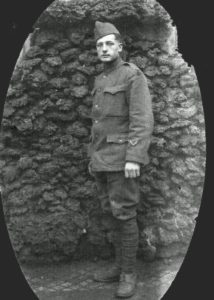
Janice Harbaugh of Jefferson shares with readers a letter her grandfather wrote in 1918 describing the Nov. 11 cease-fire that signaled the end of hostilities in World War One.
The letter was printed in the local paper at the time, and Harbaugh found the clipping in family records.
Roy Elmer Taylor was born on the family farm in Grant Township in 1892. He was the son of Samuel and Susana Taylor, and his grandfather Joshua Taylor and family were early settlers of the county in 1855.
Roy Taylor was a carpenter as a young man and worked on the Greene County courthouse. In 1917, he was with the American Expeditionary Force sent to France. He sent several letters back home, many of which were shared with newspaper readers.
Taylor spelled some of the names of places phonetically. Harbaugh used old maps to verify their correct spelling.
Monzay [Montze, now Montzeville), France
November 24, 1918
Dear Friends: Just a line while I am not busy. I am in a town on the Belgian border on the Meuse River, came into this town under shell fire the day before the fighting quit, and, believe me, it feels good not to hear the whiz and the explosion of the Boche shells and the sound of the machine guns and their bullets; but thank God it is over.
We left New York June 20 with 12 other ships and landed in Liverpool July 2; crossed England in a train to South Hampton, and the night of the Fourth of July sailed across the channel to Le Harve [Le Havre], France. In a few days, entrained in box cars for two days and nights ride to a town called Racey [Rezé]. Swam and cleaned up in an ice cold stream; marched to Aaney [Aigné] de Luke, where we drilled for about six weeks over the hills and stony roads, then hiked with a 100-pound pack about 25 miles to a railroad at Challeon [Challans], rode to Fong [Foug], close to Toul, marched about 20 miles to the front that was called a quiet sector, but didn’t remain so long, for the morning of the 12th of September about 2 o’clock, the whole sky opened up with a blaze of fire and the roar of cannon of all sizes was deafening, and at 5 o’clock we all went over the top, through barbed wire and shell holes and trenches about a mile into a timber full of German machine guns and snipers; over the hill that the French lost 30,000 men on about two years ago. Kept on going until within a few miles of Metz.
After about a month of fighting on this front, we were relieved and came to the Argonne, north of the battle-scarred field of Verdun, and after a drive of about 35 kilometers, crossed the Meuse river and came into a town called Monzay under shell fire, on the heels of the retreating Boche. The next day, the 11th of November, the firing stopped, but not until that time. We are still in the same village but don’t know how long we will stay. We expect to see German soil before we return. Eight days after we went over the top at the front called St Mihiel, I was hauled to the hospital with bronchitis and influenza. I was in the hospital at Toul and then sent to a hospital at Dijon and later to another out from Dijon. The nurses there do fine work and deserve all the praise they get. During my time at the hospitaI met a fine little French girl that has taught me all the French I know, and she says she is coming to America with me when the war finishes.
The weather is cold but nice now. It seemed as though as soon as the roar of cannon ceased it quit raining, before that it rained almost every day. You have often heard of sunny France; that cannot be because it rains almost all the time. Well, this is about the longest letter I have ever written, so will close and go to chow.
Respectfully,
Pvt. Roy E Taylor, 357th Hdqrs Co., 90th Div. APO 770 AEF
Harbaugh notes that the fine little French girl did not return home with her grandfather.
